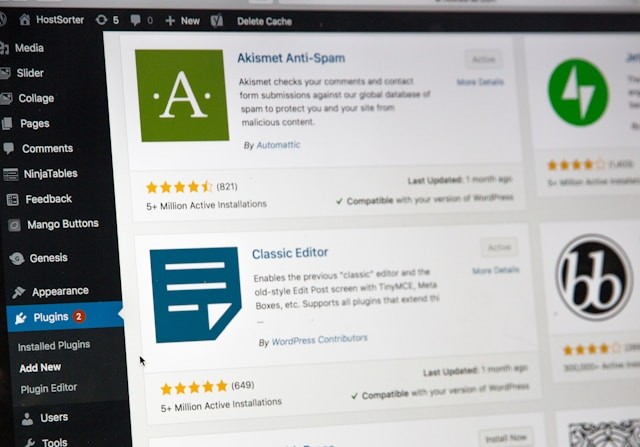For any small business looking to establish a strong online presence, choosing the right web hosting provider is essential. With so many possibilities, it’s critical to identify a provider that can satisfy the specific requirements of your company, from scalability and affordability to speed and uptime. By 2025, the market for web hosting will include advanced features that increase accessibility and dependability.
Shared Hosting vs. VPS Hosting: Which is Better for Your Small Business?
If your company has an online presence, picking the correct web hosting service is essential. The hosting you choose will determine the functionality, security, dependability, and expansion potential of your website. For small enterprises, virtual private server (VPS) hosting and shared hosting are two popular options. Knowing the advantages and disadvantages of each can assist you in selecting the best option for your particular need. To find the type that is most appropriate for your small business, let’s examine each type in detail.
1. What is Shared Hosting?
Several websites are housed on a same server with shared hosting. Every site has access to the same resources, including computing power, storage, and bandwidth. This arrangement is comparable to living in an apartment building where residents share utilities, parking spaces, and laundry rooms.
Pros of Shared Hosting
- Affordability: The most economical choice is usually shared hosting. This makes shared hosting a good option for small enterprises on a tight budget.
- Easy to Use: Customer service and control panels are frequently included with shared hosting packages. Technical know-how is not required for server management or upkeep.
- Managed Maintenance: To free you up to concentrate on your business, the hosting provider handles server upkeep, security patches, and technical problems.
Cons of Shared Hosting
- Resource Limitations: The performance of your website may be impacted by increases in traffic on other websites because you share resources with them. If your website has to load quickly or contains a lot of data, shared hosting could not offer enough resources.
- Limited Scalability: Because shared hosting is frequently less scalable, you can have lags or need to move hosting packages as your website traffic increases.
- Security Risks: On the same server, security problems on one site may have an impact on others. Although hosting companies take precautions to avoid this, shared hosting is typically more vulnerable than VPS hosting.
Ideal For: Simple websites that don’t require a lot of resources and small enterprises with low to moderate traffic. It’s perfect for companies that require a small online presence or are building a website for the first time.

2. What is VPS Hosting?
Virtual Private Server (VPS) hosting offers a compromise between dedicated and shared hosting. In VPS, the server is divided into several virtual servers, each with its own operating system and set of resources. Each virtual private server’s resources are separate from those of other servers on the same physical server, in contrast to shared hosting.
Pros of VPS Hosting:
- Increased Reliability: Your website is less impacted by other websites on the same server when it has dedicated resources. The speed and functionality of your website are enhanced by this steadiness.
- Enhanced Security: More security features are usually available with VPS hosting. With isolated settings, security flaws on other websites don’t affect your data or performance.
- Scalability and Customization: As your company expands, you can increase your resources thanks to VPS hosting’s great scalability. Additionally, you have additional authority over software installations, apps, and server settings.
Cons of VPS Hosting:
- Higher Cost: More expensive than shared hosting, VPS hosting is still less expensive than dedicated hosting. This extra cost might be a factor for small enterprises with limited resources.
- Technical Know-How Required: Although managed services are offered by many VPS providers, many VPS plans call for some level of server management expertise. It could be a disadvantage for small enterprises without an IT department.
- Maintenance Responsibilities: If you have an unmanaged VPS, you may be in charge of updates, security patches, and routine server upkeep, which can take a lot of time.
Ideal For: eCommerce sites, expanding small enterprises with rising traffic, or websites with certain technological needs. For people who want greater control, security, and scalability, it is appropriate.
3. Key Differences Between Shared Hosting and VPS Hosting
| Feature | Shared Hosting | VPS Hosting |
|---|---|---|
| Cost | Lower | Moderate to higher |
| Performance | Shared resources; variable | Dedicated resources; stable |
| Scalability | Limited | High |
| Security | Basic | Enhanced |
| Control | Limited | High |
Which Hosting Option is Better for Your Small Business?
Shared hosting might be a cost-effective option if your small business is just getting started or you have a limited budget. However, VPS Hosting provides a higher degree of performance, security, and scalability if your company expands or if your website requires greater dependability. When their demands grow, many firms find shared hosting to be adequate at first and then switch to VPS.
Top 7 Best Web Hosting Providers for Small Businesses in 2025
This guide covers the top seven web hosting providers for small businesses in 2025, highlighting their unique offerings, features, and benefits. Additionally, we’ll discuss shared hosting vs. VPS hosting to help you make the best choice for your business.
1. Hostinger – Best for Affordable and Fast Hosting
Because of its low prices and quick loading times, Hostinger is a popular option for small enterprises. Hostinger is well-known for offering premium services at affordable costs. It also has an easy-to-use interface that makes hosting environment management simple.
- Important attributes:
- For some plans, a free SSL and domain
- 24/7 customer service
- Control panel that is intuitive (hPanel)
- Weekly backups are free.
- Plans: VPS and shared hosting start at $3.95 and $1.99 per month, respectively.
- Ideal For: Small businesses, particularly those who are new to website management, who require quick and reasonably priced hosting.

Click on the code below or the Hostinger image to get 20% off when you purchase a plan with Hostinger.
Referral Code: 1LAINE09
If you need assistance, send a message to talktounwrapped@gmail.com.
2. Bluehost – Best for WordPress Integration
For small businesses that use WordPress as their content management system, Bluehost is the perfect choice because it is an official WordPress-recommended web hosting provider. Small company owners and entrepreneurs favor Bluehost because of its user-friendly interface and first-rate customer service.
- Important attributes:
- First-year domain names are free.
- SSL certificate for free
- 24/7 assistance and an intuitive dashboard
- Installing WordPress with just one click
- Plans: VPS hosting starts at $18.99 per month, while shared hosting starts at $2.95 per month.
- Ideal For: WordPress-using small businesses seeking dependable, reasonably priced hosting.
3. HostGator – Best for Scalability and Growth
HostGator is well-known for its selection of hosting packages, which make it simple for companies to launch small and expand as needed. This adaptability, together with round-the-clock assistance and a 99.9% uptime guarantee, makes HostGator an excellent choice for companies seeking sustained expansion.
- Important attributes:
- Unlimited storage and bandwidth
- Free template-based website builder
- 24/7 customer service
- Simple alternatives for scalability
- Plans: VPS and shared hosting have monthly starting prices of $23.95 and $2.75, respectively.
- Ideal For: Small companies who want to expand and want easily scalable web hosting.

4. SiteGround – Best for Performance and Security
SiteGround is well-liked for its security features, dependable uptime, and quick speeds. SiteGround offers the best performance in data centers worldwide, which makes it ideal for small enterprises that value security and speed.
- Important attributes:
- WordPress hosting that is managed and has automatic updates
- Backups every day and strong security measures
- For quicker loading times, use the free Cloudflare CDN.
- High uptime and round-the-clock assistance
- Plans: Cloud hosting is available for sites with larger traffic, and shared hosting starts at $3.99 per month.
- Ideal For: Small companies that value dependability, security, and quickness.
5. A2 Hosting – Best for Speed and Customization
For small businesses that value quick loading times, A2 Hosting is the preferred choice. A2 Hosting’s Turbo Servers offer remarkable performance, and their fully configurable hosting environment is ideal for tech-savvy users.
- Important attributes:
- Turbo Boost promises loading rates up to 20 times faster.
- Free site migration and SSL
- Money-back guarantee at any time
- Several programming languages are supported, making it developer-friendly.
- Plans: VPS hosting starts at $4.99 per month, while shared hosting starts at $2.99.
- Perfect For: Small companies seeking speed and hosting environment customization.
6. InMotion Hosting – Best for E-commerce Sites
Because of its strong e-commerce support, InMotion Hosting is well acclaimed and perfect for small enterprises who operate online storefronts. With features like numerous one-click installs for e-commerce platforms, free SSL, and SSD storage, InMotion provides a solid basis for expanding online enterprises.
- Important attributes:
- Free SSD storage and SSL for quicker loading
- Free website transfer
- 24/7 technical assistance and customer support
- Simple e-commerce platform integration
- Plans: VPS hosting starts at $17.99/month, while shared hosting options start at $2.49/month.
- Ideal For: Small e-commerce companies that require safe and quick hosting.
7. DreamHost – Best for Predictable Pricing
DreamHost is a fantastic option for small businesses looking for predictable, reasonably priced expenses because of its well-known transparent pricing system. Because DreamHost’s plans don’t increase the renewal rate, businesses can reliably manage their budgets.
- Important attributes:
- SSL and free domain
- Unlimited traffic for shared hosting packages
- Money-back guarantee for 97 days
- An easy-to-use control panel
- Options: VPS hosting options start at $10/month, while shared hosting starts at $2.59/month.
- Ideal For: Cost-conscious companies looking to reduce expenses over time.
Deciding Between Shared Hosting and VPS Hosting
Knowing the distinctions between VPS and shared hosting is crucial when selecting a hosting company. Let’s examine each choice in more detail:
- Shared Hosting: Your website and other websites share server resources, such as CPU and RAM, when you use shared hosting. Due to its lowest cost, this choice is appropriate for small enterprises with moderate traffic volumes. However, because resources are shared, the performance of your website may be impacted by periods of high traffic on other websites.
- VPS hosting is a step up, which allocates a specific amount of server resources to your website. Because other websites on the server don’t harm you, you have more control and better speed. It’s the best option for small organizations who need certain configurations that are shared or are seeing consistent traffic increase.

Ending Thoughts
The performance, security, and dependability of your website in 2025 depend on your small business’s choice of web hosting provider. Every provider on this list has special benefits, ranging from high-speed hosting with A2 Hosting to affordable plans with Hostinger. When choosing between shared and VPS hosting, take into account your company’s requirements, traffic projections, and financial constraints.
Ultimately, you will have a strong basis for a quick, dependable website that supports your online success if you select a provider who shares your company’s growth objectives. These leading web hosting companies can confidently assist you in 2025, whether you’re starting a new website or updating your hosting to accommodate growing demand.
Read-Also: How To Get Traffic To My Website In 2023.












